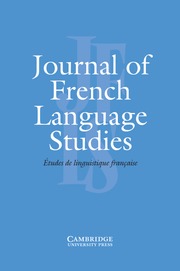Crossref Citations
This article has been cited by the following publications. This list is generated based on data provided by
Crossref.
Véronique, Daniel
2005.
Les interrelations entre la recherche sur l’acquisition du français langue étrangère et la didactique du français langue étrangère.
Acquisition et interaction en langue étrangère,
p.
9.
Lyster, Roy
and
Mori, Hirohide
2006.
INTERACTIONAL FEEDBACK AND INSTRUCTIONAL COUNTERBALANCE.
Studies in Second Language Acquisition,
Vol. 28,
Issue. 02,
Mehisto, Peeter
and
Asser, Hiie
2007.
Stakeholder Perspectives: CLIL Programme Management in Estonia.
International Journal of Bilingual Education and Bilingualism,
Vol. 10,
Issue. 5,
p.
683.
Dekeyser, Robert M.
2007.
Practice in a Second Language.
p.
139.
Ranta, Leila
and
Lyster, Roy
2007.
Practice in a Second Language.
p.
141.
Early, Margaret
2008.
Encyclopedia of Language and Education.
p.
1293.
IZQUIERDO, JESÚS
and
COLLINS, LAURA
2008.
The Facilitative Role of L1 Influence in Tense–Aspect Marking: A Comparison of Hispanophone and Anglophone Learners of French.
The Modern Language Journal,
Vol. 92,
Issue. 3,
p.
350.
JeongDongBin
and
Ghymn, Jisook
2008.
A study on the effect of focus-on-form teaching strategies in the early English immersion differentiated classroom.
English Language Teaching,
Vol. 20,
Issue. 3,
p.
251.
Peter, Lizette
Hirata-Edds, Tracy
and
Montgomery-Anderson, Bradley
2008.
Verb development by children in the Cherokee language immersion program, with implications for teaching.
International Journal of Applied Linguistics,
Vol. 18,
Issue. 2,
p.
166.
Yu, MING‐CHUNG
2008.
Teaching and Learning Sociolinguistic Skills in University EFL Classes in Taiwan.
TESOL Quarterly,
Vol. 42,
Issue. 1,
p.
31.
Izquierdo, Jesús
2009.
L'aspect lexical et le développement du passé composé et de l'imparfait en français L2 : Une étude quantitative auprès d'apprenants hispanophones.
The Canadian Modern Language Review,
Vol. 65,
Issue. 4,
p.
587.
Evans, Michael
2009.
Using stimulated recall to investigate pupils' thinking about online bilingual communication: Code‐switching and pronominal address in L2 French.
British Educational Research Journal,
Vol. 35,
Issue. 3,
p.
469.
Yang, Yingli
and
Lyster, Roy
2010.
EFFECTS OF FORM-FOCUSED PRACTICE AND FEEDBACK ON CHINESE EFL LEARNERS’ ACQUISITION OF REGULAR AND IRREGULAR PAST TENSE FORMS.
Studies in Second Language Acquisition,
Vol. 32,
Issue. 2,
p.
235.
TURNBULL, MILES
CORMIER, MARIANNE
and
BOURQUE, JIMMY
2011.
The First Language in Science Class: A Quasi‐Experimental Study in Late French Immersion.
The Modern Language Journal,
Vol. 95,
Issue. s1,
p.
182.
Lyster, Roy
and
Genesee, Fred
2012.
The Encyclopedia of Applied Linguistics.
Heift, Trude
and
Rimrott, Anne
2012.
Task‐Related Variation in Computer‐Assisted Language Learning.
The Modern Language Journal,
Vol. 96,
Issue. 4,
p.
525.
Tipurita, Manuela-Elena
and
Jean, Gladys
2014.
Enseignement explicite du genre des noms en français : expérimentation au primaire en classe d’immersion.
The Canadian Modern Language Review,
Vol. 70,
Issue. 3,
p.
279.
PRESSON, NORA
MacWHINNEY, BRIAN
and
TOKOWICZ, NATASHA
2014.
Learning grammatical gender: The use of rules by novice learners.
Applied Psycholinguistics,
Vol. 35,
Issue. 4,
p.
709.
Bakshiri, Naeimeh
and
Mohammadi, Mojtaba
2014.
Proactive/Reactive Focus on Form and Immediate/Delayed Writing Production.
Procedia - Social and Behavioral Sciences,
Vol. 98,
Issue. ,
p.
334.
Goo, Jaemyung
Granena, Gisela
Yilmaz, Yucel
and
Novella, Miguel
2015.
Implicit and Explicit Learning of Languages.
Vol. 48,
Issue. ,
p.
443.




